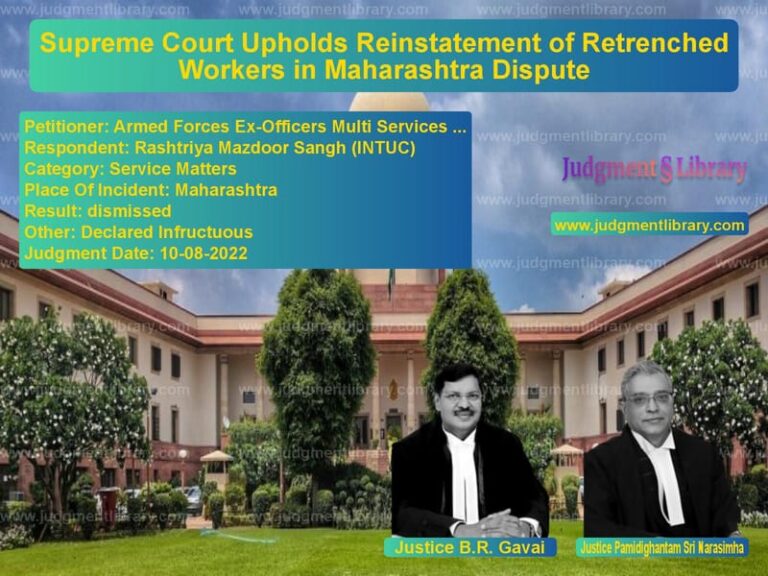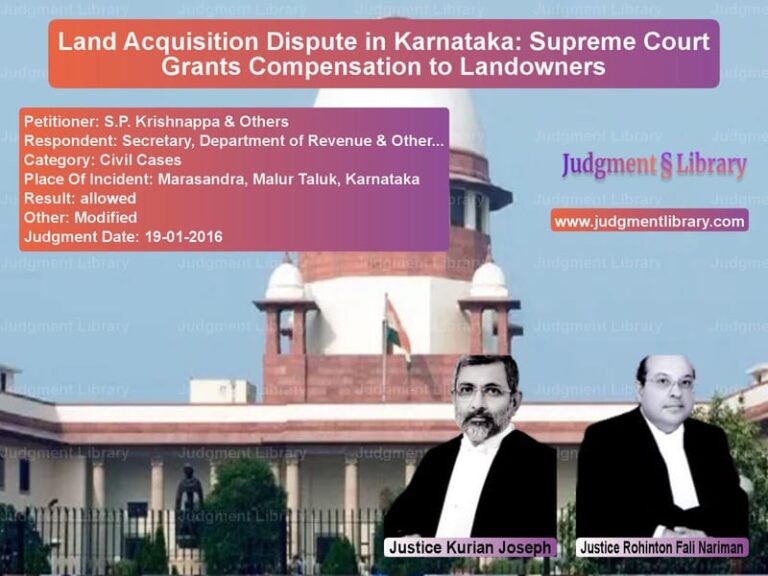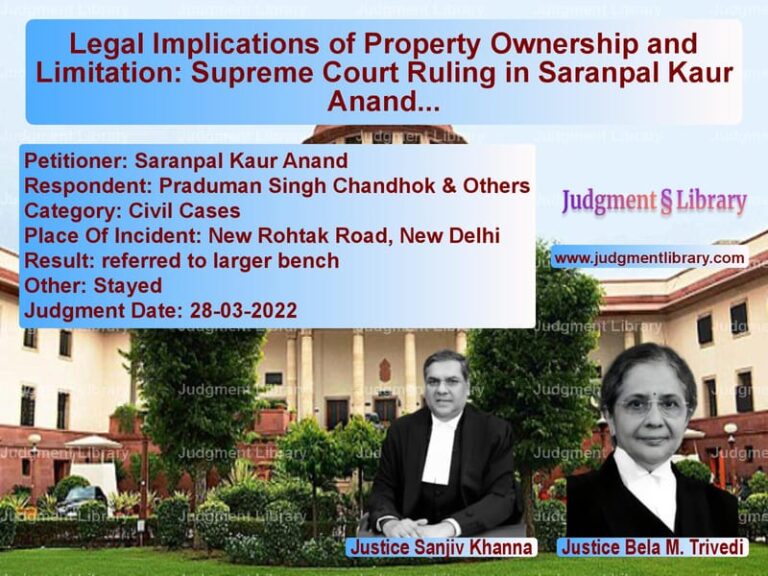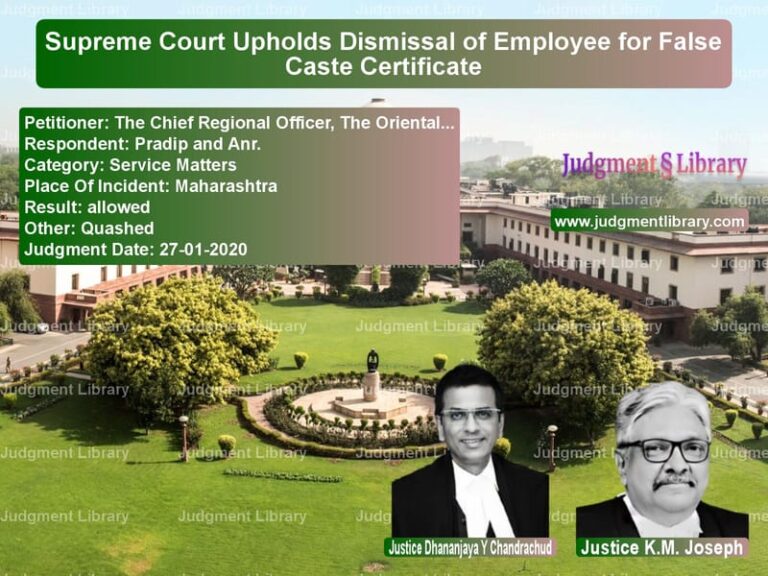Limitation Extension and Delay in Consumer Complaints: Supreme Court Rules on Written Statements
This case deals with the appeals filed by M/s SS Group Pvt. Ltd., a builder, challenging the order passed by the National Consumer Disputes Redressal Commission (NCDRC). The appeal centers on the delay in filing a written statement in response to consumer complaints and whether the time limits for filing such statements should be extended due to the ongoing COVID-19 pandemic. The case highlights the intersection of consumer protection law, limitation periods, and judicial discretion during exceptional circumstances like a pandemic.
Background of the Case
The respondents in this case had booked flats with the appellant, M/s SS Group Pvt. Ltd. However, the flats were not delivered on time, leading the respondents to file consumer complaints before the NCDRC, claiming a refund of their money. Notices for these complaints were issued in June 2020, and the appellant received them by July 13, 2020. Under Section 38(2)(a) of the Consumer Protection Act, 2019, a 30-day period is prescribed for filing a written statement, which could be extended by a further 15 days. However, the appellant filed its written statement on August 31, 2020, beyond the prescribed 45 days.
As per a Constitution Bench decision in New India Assurance Co. Ltd. v. Hilli Multipurpose Cold Storage (P) Ltd., the Consumer Court has no power to extend the time for filing a response beyond 45 days. The NCDRC therefore declined to take the written statement on record due to this delay. This decision was contested by the appellant in the present appeals.
Arguments by the Appellant
The appellant, represented by counsel Mr. Sanjay K. Shandilya, presented the following key arguments:
- Extension of Limitation Due to COVID-19: The appellant argued that the ongoing COVID-19 pandemic and the resultant lockdown had made it difficult to meet deadlines. They pointed to the Supreme Court’s order on March 23, 2020, extending limitation periods for all judicial proceedings, which included civil and consumer disputes. The appellant contended that the period for filing the written statement should be extended accordingly, as per the general order.
- Non-Compliance with Statutory Deadlines: The appellant emphasized that the statutory deadlines under Section 38 of the Consumer Protection Act, 2019, were affected by the pandemic and that the general extension of limitation periods should apply to all proceedings, including consumer complaints.
- Judicial Discretion in Exceptional Circumstances: The appellant argued that the NCDRC should have exercised judicial discretion in allowing the delay, given the exceptional circumstances of the pandemic and the uncertainty it caused to litigants.
Arguments by the Respondents
The respondents, represented by counsel Mr. Naveen Kumar, argued as follows:
- Adherence to Statutory Timelines: The respondents pointed out that the Consumer Protection Act sets clear timelines for filing written statements. They contended that allowing an extension of time would go against the letter of the law, and that the appellant’s failure to meet the deadline should not be excused, especially when the period of 45 days had already expired.
- Impact of Delay on Consumer Rights: The respondents emphasized that delays in filing responses to consumer complaints harm the rights of consumers. They argued that allowing such delays would set a poor precedent and undermine consumer protection.
- Relief for Other Parties: The respondents noted that the delay in filing the written statement was solely attributable to the appellant, and no other party in the matter had sought an extension of time due to the pandemic. Therefore, they argued that the appellant should not be allowed to benefit from a delay it caused.
Supreme Court’s Analysis
The Supreme Court analyzed several key aspects of the case:
- Interpretation of Section 38 of the Consumer Protection Act: The Court examined Section 38(2)(a) of the Consumer Protection Act, 2019, which mandates a 30-day period for filing a written statement. The Court also reviewed the provision allowing a 15-day extension. The appellant’s argument regarding the general extension of limitation periods due to COVID-19 was considered in light of the existing law, and the Court recognized that the pandemic had disrupted normal procedures.
- Impact of the Pandemic on Judicial Deadlines: The Court considered the earlier Supreme Court order dated March 23, 2020, which extended the limitation periods for all legal proceedings due to the pandemic. The Court noted that the extension applied to all proceedings, and thus, the period for filing the written statement should also be treated as extended in this case.
- Judicial Discretion and Public Interest: The Court emphasized that the NCDRC’s refusal to accept the appellant’s written statement did not take into account the extraordinary circumstances created by the pandemic. The Court noted that the appellant’s request for an extension was reasonable given the situation and that denying this request would undermine the principles of justice and fairness.
Supreme Court’s Judgment
The Supreme Court ruled in favor of the appellant, holding that the delay in filing the written statement should be allowed due to the extraordinary circumstances of the COVID-19 pandemic. The Court set aside the order passed by the NCDRC and directed that the appellant’s written statement be accepted. Furthermore, the Court observed:
“The limitation period for filing the written statement should be treated as extended due to the general order passed by this Court in the wake of the COVID-19 pandemic. The NCDRC should not have denied the appellant’s written statement due to the delay caused by circumstances beyond their control.”
The Court further directed that the proceedings before the NCDRC should proceed expeditiously, with the written statement now being taken on record. The Court emphasized that the interests of justice require flexibility in exceptional cases, and the appellant’s failure to meet the deadline was not due to negligence or malice.
Conclusion
This judgment highlights the flexibility and discretion available to courts in exceptional circumstances, such as the ongoing COVID-19 pandemic. The Supreme Court’s decision to extend the limitation period for filing written statements under the Consumer Protection Act recognizes the disruptions caused by the pandemic and seeks to balance procedural fairness with the need to protect consumer rights. The ruling also reinforces the principle that justice should be served even in challenging times, ensuring that legal processes do not unfairly disadvantage litigants due to unforeseen circumstances.
Petitioner Name: M/s SS Group Pvt. Ltd..Respondent Name: Aaditiya J. Garg & Anr..Judgment By: Justice Vineet Saran, Justice S. Ravindra Bhat.Place Of Incident: India.Judgment Date: 17-12-2020.
Don’t miss out on the full details! Download the complete judgment in PDF format below and gain valuable insights instantly!
Download Judgment: Ms SS Group Pvt. Lt vs Aaditiya J. Garg & A Supreme Court of India Judgment Dated 17-12-2020.pdf
Direct Downlaod Judgment: Direct downlaod this Judgment
See all petitions in Contract Disputes
See all petitions in Consumer Rights
See all petitions in Damages and Compensation
See all petitions in Judgment by Vineet Saran
See all petitions in Judgment by S Ravindra Bhat
See all petitions in allowed
See all petitions in supreme court of India judgments December 2020
See all petitions in 2020 judgments
See all posts in Civil Cases Category
See all allowed petitions in Civil Cases Category
See all Dismissed petitions in Civil Cases Category
See all partially allowed petitions in Civil Cases Category







